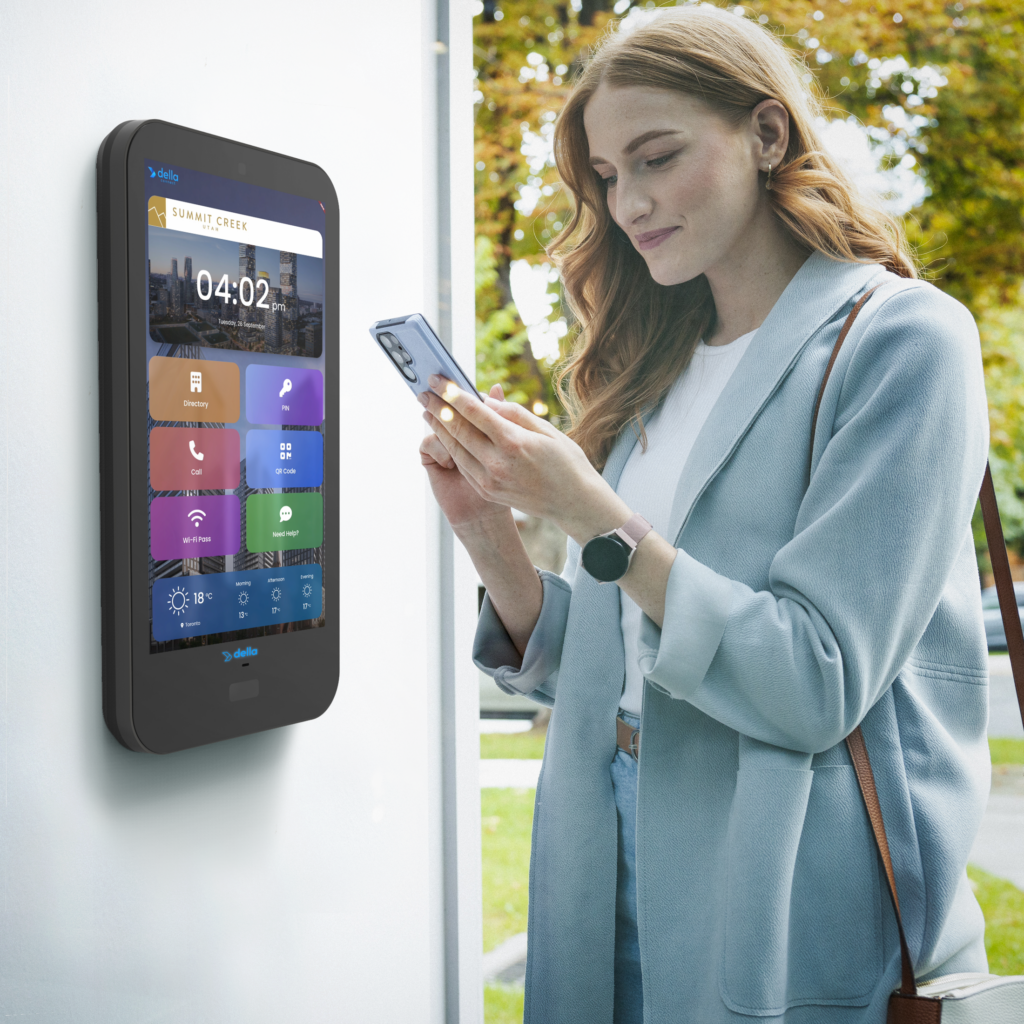- Sales: +1 385 334 4390Support: +1 801 396 2521
All Hospitals Have TV, But Not All Have Great TV
25 November 2021Great Hospitality is More than Just TV. Learn our Top 5 Hospitality Must-Haves
9 December 2021Wi-Fi connections for campgrounds have become a necessity, especially with how connected to social media we’ve become.
Camping is the perfect way to get away from the world, decompress, and let the stresses and pressures of life melt away. Yet, campers still find it hard to disconnect and need a device to check email, do research, watch a movie, or just surf the Web.
There are several options to finding a Wi-Fi connection at a campground. Many campgrounds have their own networks that can be extended with a booster, but if not, a cell phone can be used as a mobile hotspot depending on the phone’s data plan and the camp’s proximity to cell phone towers.
This article will discuss what to look for in a campground connection to do everything from checking your email to streaming Netflix. If you are set on planning your stay at a campground that does not offer Wi-Fi, and you are not near restaurants or buildings that have open Wi-Fi, there are still options to do your work and stream your favorite shows.
Deciding How to Connect to Wi-Fi at a Campground
Data from 2015 illustrates the importance of campground Wi-Fi: 51% of campers said they go online at least once a day, 41% said the availability of free Wi-Fi influenced what campground they stayed at, and a whopping 83% of campers said they would not go camping without their cell phone. Suffice to say that Wi-Fi matters more than hot water.
Even today, not all campgrounds offer free or low-priced Wi-Fi for campers. If you are camping near cell phone towers, your cell phone or a mobile hotspot device will work just fine (for a fee, of course, and for the use of your cell phone data). The option for Wi-Fi really depends on how much you camp and where you stay, but here are options:
- Use the campground’s Wi-Fi or the local area’s Wi-Fi (like a restaurant or library)
- Turn your cell phone into a mobile hotspot
- Purchase a portable Wi-Fi router
- Purchase an Internet USB
- Pay for a satellite device and Wi-Fi service
Using a local restaurant or library with free Wi-Fi means you need to actually leave the campground for service. A campground may offer its patrons Wi-Fi, but it could be slow and unreliable. A Wi-Fi booster or extender can be purchased to help extend this coverage. Yet, a smartphone can easily be turned into an Internet device.
You could also purchase a portable Wi-Fi router, which will not drain your cell phone’s data and battery. This option still relies on connectivity to cell towers. That is, if your cell phone does not have bars, your portable mobile router probably will not work. If you are camping in the backcountry, a satellite device may work best for an expensive price.
Use the Campground Wi-Fi Equipment
Probably the easiest way to get Wi-Fi while camping is to use the campground’s Wi-Fi if available. Campgrounds know that the demand for Wi-Fi has become a must-have for campers, and offering it for a small fee or for free makes them more attractive than their competitors. However, there are some things to look for before setting up camp.
After you confirm that a campground offers Wi-Fi, you should find out what their network performance is and if it is capable of doing what you need. If you are just checking email, the Wi-Fi is probably fine. However, if you plan on streaming movies or videos, you should ask what speed their Internet is in terms of the Megabits per second (Mbps).
For example, Netflix streaming requires a minimum internet speed of 3 Mbps for standard definition and 5 Mbps for high definition. Gaming needs much more, a minimum of between 4 and 8 Mbps and a much higher 10 to 25 for ultimate gaming experiences. Working from camp may be much easier.
The main issue with campground Wi-Fi is that it may have too many users simultaneously, which will slow down the connection. The camp’s router and modem, which are probably in the camp’s main office, could be too far away to get a strong signal. This will make your connection slow, so a booster, which extends network coverage, may be needed.
Boosters Can Extend the Strength of a Campground’s Wi-Fi
Many campers who rely on the campsite’s Wi-Fi also bring a booster or extender along for their trip. A booster does not give you Wi-Fi service; instead, it strengthens the signal of any networks already available, whether it is from the campground, your cell phone, or from another Wi-Fi device. This helps amplify your Wi-Fi connection during your stay.
The campground should hopefully have broadband Wi-Fi so that a wireless router or access point is easily accessible for connection. This connection can be weak or slow due to distance or use by other campers, and your booster will extend the range and signal strength of the Wi-Fi service for you.
Sites like Amazon have boosters for as low as $15 or $20, but a quality booster can cost more than $500. If you are someone who camps a few times a year, this may not be the most lucrative option. You may want to use the cell phone you already pay for as a mobile hotspot. You can weigh the price of each and see which one works for you.
As with any device, you should read the reviews of a booster before purchasing one to make sure it is what you need for your camping life. Make sure to read about not only strength but ease of set up and how it works in different camping areas. As long as there is service, you can enjoy watching Netflix in a remote area under the stars.
Using Your Cell Phone as a Mobile Hotspot
Using your cell phone as a hotspot is a convenient option depending on the availability of cell towers and your specific data plan. You can turn the hotspot on when you need to stream a Netflix film and then turn it off afterward to save metered data if your service is not unlimited. Hotspots use your phone’s data, so be sure to check your plan with your carrier.
A phone hotspot can be turned on and off since you are basically turning your phone into a Wi-Fi access point. This saves both data and your battery. Nearly all cell phone carriers have the capabilities to turn phones into hotspots and, if this will be your only option for Wi-Fi, you can check your settings before you begin your camping trip:
- Android – Go to Settings, Connections, Mobile Hotspot, and Tethering
- iPhone – Go to Settings and then Personal Hotspot
For example, Verizon tends to be the most popular plan for campers, with three different hotspot plans that offer different levels of data for a price. T-Mobile used to be known as the worst for camping coverage – the minute you were out in the wilderness, you lost your coverage – but they have expanded their towers and offer unlimited data plans.
Cell phone hot spots are best for camping trips that are a week or less if you do not have an unlimited plan. Plans usually offer around three to thirty gigabytes of full-speed data per month. If you use all your monthly data, it could be throttled, which means your provider begins to slow down your Internet speed. This option also drains your battery.
Mobile Hotspot Routers Work Like Your Cell Phone
A mobile hotspot is a small device that can fit in a purse, yet it is powerful enough to bring Wi-Fi into your campground without needing to be plugged in (impossible in a tent) or using your cell data. They have their own standalone cell plan with your cellular carrier, which means you pay a fee for another line that turns it on and off for service.
Similar to using your cell phone as a hotspot, every mobile carrier has their own mobile hotspot devices and plans. Keep in mind that you will probably need to purchase the hotspot device as well as pay a monthly fee for the additional line. Therefore, this is a good option for individuals who will use this to go camping on a regular basis.
Another negative with mobile hotspots is that, like your cell phone, its coverage is only as strong as the coverage of your carrier. AT&T and Verizon have been known to be some of the best mobile hotspots for campers. Yet, no matter what carrier you use, you still need to be within the range of a cell phone tower to even get a signal.
If you are planning to camp hundreds of miles in the wilderness, a mobile hotspot probably will not suffice. Adding another line to your plan is not worth it if you cannot even get a signal. Mobile hotspots are sufficient for reputable camping areas that are close to the “real world,” but backcountry camping may require a portable satellite dish.
Prepaid Routers Versus a Monthly Contract
If you decide to visit your cell phone carrier and peruse mobile routers, you will need to decide whether you want to enlist in a monthly contract or purchase a pre-paid mobile router. They both have advantages and disadvantages depending on your needs, and as long as cell service is available (if your phone does not work, neither will this device):
Signing up for a Contract:
- An advantage is that you will not need to refill the device if you run out of data.
- An advantage is that you will normally have better coverage and service through your cell phone plan.
- A disadvantage is that you will have a monthly fee regardless of whether you use the router or not. If it sits in a drawer for months, you are still paying for the service.
Using a Prepaid Mobile Router:
- An advantage is that you only pay for the Internet you actually use while camping.
- A disadvantage is it may be harder to find quality coverage in rural camping areas.
- A disadvantage is that you need to refill it if you use all of your data, so you need to monitor how much you have used or how much you need while camping.
When using mobile routers, whether it is with a contract or prepaid plan, you do get what you pay for and should avoid the cheaper versions of the product. A quality device should give you enough Wi-Fi in most camping areas.
Another Inexpensive Option is an Internet USB
There are also internet USBs that can connect to a 3G network and deliver quality Wi-Fi while camping. This is a little stick that you can purchase and plug into your laptop for Internet service. However, this comes with the same issues as a cell phone and mobile device in that it may not have service if you travel far into the woods or mountains.
There are different options that you can review before purchasing this little device:
- Sign up for a monthly contract with your cell phone company
- Purchase a prepaid Internet USB
The two options above have the same advantages and disadvantages as the mobile router option. On one hand, if you pay a monthly fee, you will probably have unlimited data. But, you are paying for this little stick even if it sits in a drawer for months on end. A pre-paid USB means you only pay for the Internet you use, but you run out quicker.
A pre-paid USB means you do not have to worry about signing a contract with your cell phone carrier each month. So, it depends on how often you camp, where you camp and whether service is available, and whether a contract will be more lucrative in the long run because you get better prices overall and more quality service.
Satellite Internet Is the Most Reliable, but Also the Most Expensive
Satellite Internet gives campers the most reliable and strongest Wi-Fi in rural areas. This is because it does not rely on cellular networks like your cell phone or a mobile router device. If you are camping in the most reclusive, rural camp areas, a satellite may be your only option for Wi-Fi, but it comes with a price.
Just like a mobile router device, you should do your homework before purchasing a satellite Internet device since they may run hundreds to thousands of dollars for spotty Wi-Fi (around 1 to 2 Mpbs). This option is best for individuals who camp all the time in the most remote areas known to have absolutely no cell service available.
Will satellite internet give you the same fast, reliable Wi-Fi that you have in the privacy of your own home? Probably not. But, it does give you Wi-Fi wherever you may be camping, whether there are cell phone towers nearby or not. You just need to weigh the cost of the device and see if it is worth it for your camping needs.
Using satellite Wi-Fi will give you the best connection overall and most flexibility since it does not rely on a cellular network. However, it is the most expensive and really should only be an option for the serious camper who spends his or her life in the most remote backwoods that does not have any cell service available.
In the End, Do Your Homework
As you can see, getting a Wi-Fi connection at a campground takes some time and research. You need to do your homework before deciding whether you can simply get Wi-Fi for free at the campground, use your cell phone as a mobile hotspot, or need to actually purchase a mobile router or expensive satellite device.
First, find out if your campground has Wi-Fi service and read reviews, if possible, about its availability and overall strength. Using campground Wi-Fi is certainly the best option for someone who does not need to “rough it” in the great outdoors. It also saves the data and battery from a cell phone and the cost of purchasing a mobile device.
If you are using your cell phone or mobile device, create a map of the campground (Google Maps can screenshot the campground) to see if there are cell towers available, if there are obstacles such as trees or buildings that can stop or impede the cellular signal. It is better to find out beforehand if your cell phone or router even has service.
Groove Technology Solutions Can Transform Your Campground
Wi-Fi connections for campgrounds have turned into a must-have, not just a luxury during your stay. Campers rely on this benefit to check email, access Google, and stream their favorite shows and movies while lying under the stars.
At Groove Technology Solutions, we know that as long as your campground offers free and reliable Wi-Fi, you have nothing to worry about. Your old cable service can now be replaced with our state-of-the-art options, and we only provide the friendliest customer service. Find out why we have thousands of happy clients across all 50 states and request a quote from us today.
Sources:
https://thedyrt.com/magazine/lifestyle/rv-wifi-traveling/
https://www.peek.com/pro/customer-experience/4-steps-to-setting-up-wifi-at-your-campground
https://www.engeniustech.com/wp-content/uploads/2016/11/Campground_WiFi_Guide.pdf
https://www.satelliteinternet.com/resources/camping-wifi/
https://www.gnswireless.com/info/campground-wifi
https://vancampinglife.com/internet-while-camping-8-ways-to-get-Wi-Fi/
https://www.allconnect.com/blog/faqs-internet-speeds-what-speed-do-you-need/


Explore Our Industries and Services in Detail
Discover how our all-in-one technology solutions and systems integrations can improve your guest and resident experience.

